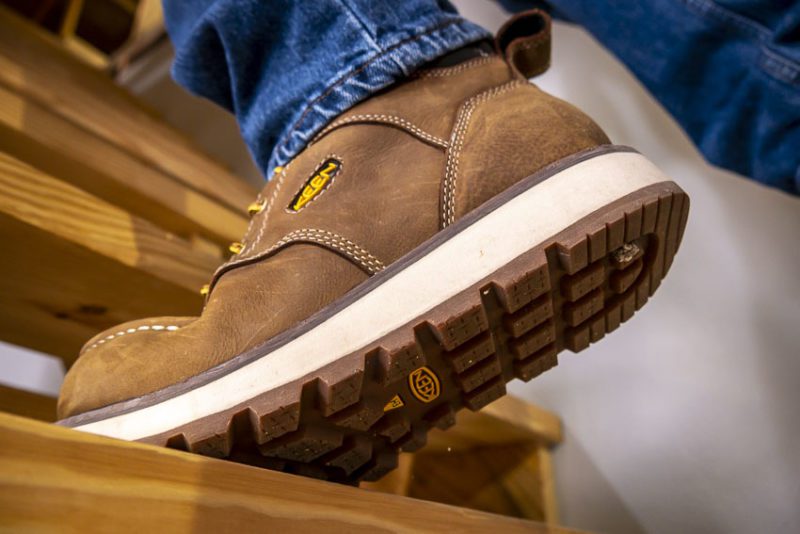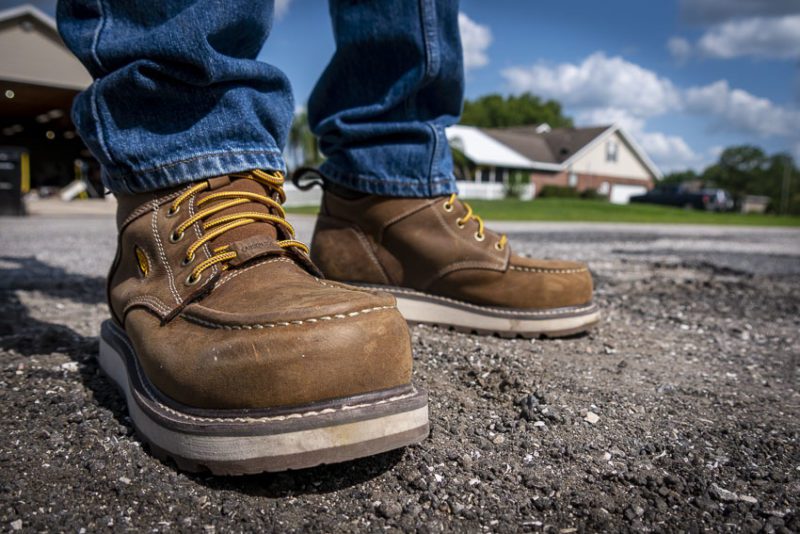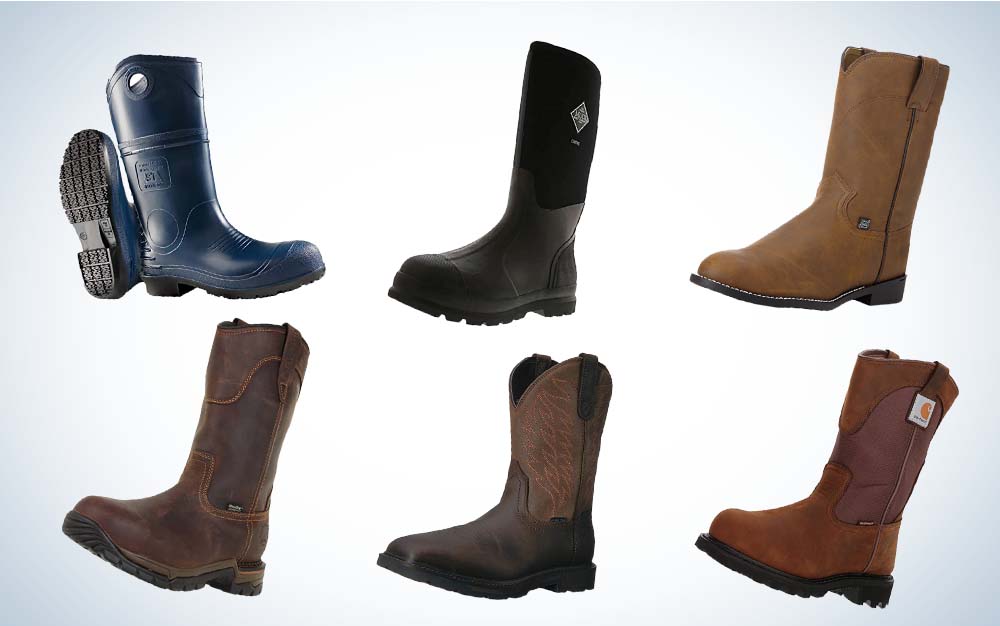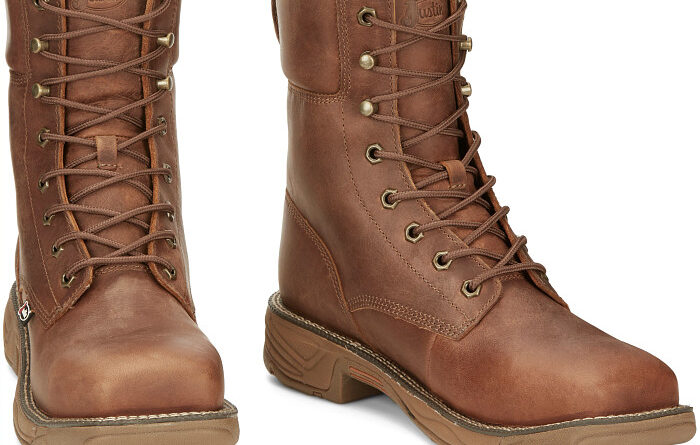
This post may contain affiliate links which means I may receive a commission for purchases made through links. Learn more on my Private Policy page.
Factors to Consider
When it comes to general agricultural and construction work, wearing the right footwear is crucial for your safety, comfort, and overall productivity. With so many options available, it can be overwhelming to choose the best shoes or boots for the job. However, considering a few key factors can help you make an informed decision.
Safety
Safety should be your top priority when selecting footwear for agricultural and construction work. Look for shoes or boots that meet safety standards and offer features such as steel toe caps, puncture-resistant soles, and electrical hazard protection. These features will provide essential protection against falling objects, sharp tools, and electrical hazards.
Durability
Working in agricultural and construction environments calls for footwear that can withstand demanding conditions. Opt for shoes or boots made from high-quality materials such as leather or rubber, as these are known for their durability. Reinforced stitching and toe guards can also enhance the longevity of your footwear, preventing them from wearing out quickly.
Comfort
Long hours on your feet can take a toll on your comfort levels, so it’s important to choose footwear that provides ample cushioning and support. Look for shoes or boots with cushioned insoles, padded collars, and arch support. Proper ventilation is another important factor to consider, as it will prevent your feet from sweating excessively.
Traction
Agricultural and construction work often involves walking on uneven surfaces or slippery terrain. To avoid accidents and maintain stability, opt for footwear with slip-resistant outsoles. Look for patterns or treads that provide good traction on different surfaces, including mud, gravel, or wet surfaces.
Protection
Besides safety features like steel toe caps, additional protection can be beneficial in harsh work environments. Water-resistant or waterproof footwear will keep your feet dry in wet conditions, and insulation can help to keep your feet warm in cold climates. These added protection features ensure your feet remain comfortable and protected throughout the day.
Support
Working on construction sites or agricultural fields requires a lot of physical activity, which can put a strain on your feet and ankles. Look for shoes or boots that provide excellent ankle support, as well as a snug and secure fit. This will help prevent injuries and provide stability during repetitive movements or heavy lifting.
By considering these factors – safety, durability, comfort, traction, protection, and support – you can confidently choose the best footwear for your general agricultural and construction work needs. Remember, investing in high-quality footwear is an investment in your overall well-being and productivity.

This image is property of cdn.agronomag.com.
## Types of Footwear
When it comes to finding the best footwear for general agricultural and construction work, there are several options to consider. Safety is paramount in these industries, so it's essential to choose shoes or boots that provide the necessary protection.
Safety Boots
One popular choice for both agricultural and construction work is safety boots. These boots are specifically designed to meet safety standards and provide enhanced protection for your feet. They often feature reinforced toes, slip-resistant soles, and are made with durable materials.
Work Shoes
If you're looking for a more lightweight and comfortable option, work shoes can be a great choice. These shoes are designed with safety features such as slip resistance and reinforced toes, but they tend to be lighter and more flexible than traditional boots.
Rubber Boots
For those working in wet or muddy conditions, rubber boots are an excellent option. They provide waterproof protection and are easy to clean. Rubber boots are often used in agriculture to keep your feet dry while working in fields or handling animals.
Hiking Boots
If you're looking for footwear that provides both protection and comfort, hiking boots are a versatile option. These boots are designed to withstand rugged terrain, making them suitable for outdoor work in agricultural and construction settings.
Steel Toe Boots
Among the most widely used options in these industries, steel toe boots offer maximum protection. They have a steel reinforcement in the toe area, making them extremely durable and effective at preventing injuries from heavy objects or accidental impacts.
Composite Toe Boots
Similar to steel toe boots, composite toe boots also provide excellent protection. However, instead of steel, they are made from non-metallic materials such as fiberglass or Kevlar. This makes them lighter and more comfortable to wear, without compromising on safety.
Insulated Boots
For those working in colder climates or environments, insulated boots are a must-have. These boots are designed to keep your feet warm and comfortable, even in freezing temperatures. The insulation helps to trap and retain heat, ensuring that your feet stay protected against the cold.
Waterproof Boots
Working in wet or rainy conditions requires footwear that is not only durable but also waterproof. Waterproof boots are designed to keep your feet dry, even when working in standing water or muddy environments. They often have additional features such as sealed seams or waterproof membranes to provide maximum waterproof protection.
Finding the best footwear for general agricultural and construction work is crucial for your safety and comfort. Consider the specific requirements of your job and choose footwear that provides the necessary protection, whether it's safety boots, work shoes, rubber boots, hiking boots, steel toe boots, composite toe boots, insulated boots, or waterproof boots. Remember, investing in quality footwear will not only keep you safe but also increase your productivity and satisfaction while on the job.
Features to Look For
When it comes to finding the best footwear for general agricultural and construction work, there are several features you should consider. These features ensure that your shoes or boots provide the necessary protection and comfort for long hours on your feet in demanding environments.
Slip-resistant soles
One of the key features to look for is slip-resistant soles. These provide you with excellent traction, minimizing the risk of accidents on slippery surfaces. Look for shoes or boots with high-quality rubber outsoles that have specially designed treads for superior grip.
Puncture-resistant midsoles
Construction sites and agricultural settings often have numerous sharp objects on the ground, so it's crucial to have footwear with puncture-resistant midsoles. This added protection prevents injuries from nails, thorns, and other sharp objects.
Impact protection
Construction work involves heavy machinery and materials, which can pose a threat to your feet. Choose footwear that offers impact protection, such as steel or composite toe caps. These protect your toes from falling objects and collisions.
Arch support
Long hours on your feet can take a toll on your arches. Look for footwear that provides excellent arch support to reduce fatigue and prevent foot pain.
Moisture-wicking lining
Working in agricultural or construction settings often means encountering moisture and sweat. A moisture-wicking lining helps keep your feet dry by drawing away moisture and allowing for better airflow.
Breathability
In hot and humid conditions, it's important to have footwear that allows your feet to breathe. Look for shoes or boots made with breathable materials like mesh or leather, as these help prevent excessive sweating and discomfort.
Adjustable closures
Having footwear with adjustable closures, such as laces or straps, allows you to customize the fit to your liking. This ensures maximum comfort and stability throughout the day.
Electrical hazard protection
If you work in an environment where you may come into contact with electricity, it is vital to have footwear with electrical hazard protection. This feature helps prevent electrical shocks and provides an additional layer of safety.
By considering these important features, you can find the best footwear for your general agricultural and construction work. Take the time to find the right pair that prioritizes your safety and comfort, enabling you to focus on the task at hand.

This image is property of www.protoolreviews.com.
## Materials Used
When it comes to choosing the best footwear for general agricultural and construction work, you want to make sure you have the right materials that can withstand the demands of these tough environments. Here are some materials commonly used in work footwear and their benefits:
Genuine leather
Genuine leather is a popular choice for work boots due to its durability and resistance to water, chemicals, and abrasion. It also offers good breathability, allowing your feet to stay comfortable throughout the day.
Nylon
Nylon is a lightweight synthetic material that is often used in work boots to provide flexibility and breathability. It is resistant to water and offers good abrasion resistance, making it suitable for a variety of work conditions.
Rubber
Rubber is known for its excellent traction and durability, making it a great choice for work boots. It is resistant to oil and chemicals, providing protection in hazardous environments.
EVA (Ethylene-vinyl acetate)
EVA is a lightweight and flexible material that offers cushioning and shock absorption. It is commonly used in the midsole of work boots to provide all-day comfort.
Polyurethane
Polyurethane is a durable and lightweight material that offers excellent insulation and shock absorption. It is often used in the outsole of work boots to provide stability and protection.
Neoprene
Neoprene is a synthetic material known for its resistance to oil, chemicals, and heat. It is commonly used in work boots to provide insulation and protection in extreme conditions.
Gore-Tex
Gore-Tex is a waterproof and breathable membrane that is often used in work boots to keep your feet dry and comfortable. It allows moisture to escape while preventing water from entering the shoe.
Memory foam
Memory foam is a soft and responsive material that molds to the shape of your foot, providing customized comfort and support. It is commonly used in the insole of work boots to alleviate pressure points and reduce fatigue.
Choosing the best footwear for general agricultural and construction work requires considering the materials used. Genuine leather, nylon, rubber, EVA, polyurethane, neoprene, Gore-Tex, and memory foam are all materials that offer different benefits to ensure your feet stay protected and comfortable throughout the day. Choose the right combination of materials that fit your specific work conditions and personal preferences for the best results.

This image is property of www.protoolreviews.com.
## Different Footwear for Various Work Environments
When it comes to finding the best footwear for general agricultural and construction work, it is essential to consider the specific work environment and the nature of the tasks you will be performing. The right footwear can provide the necessary protection and support to keep you comfortable and safe throughout the day.
Farming and Agriculture
In the farming and agricultural sector, boots with steel-toe caps are essential to protect your feet from heavy machinery and falling objects. Look for boots that are oil and chemical resistant, as they can withstand the harsh chemicals often used in the industry. Additionally, boots with good traction and waterproof features are crucial for working in muddy fields and wet conditions.
Construction and Heavy-duty Work
Construction and heavy-duty work require boots that are durable and provide excellent support for long hours on your feet. Look for boots with reinforced steel toes, puncture-resistant soles, and ankle support. Insulated boots are perfect for working in cold environments, while waterproof and slip-resistant boots are essential for jobs that involve wet or oily surfaces.
Outdoor and Rough Terrain
When working in outdoor and rough terrain environments, choose boots that are designed for rugged conditions. Look for footwear with aggressive treads, ankle support, and waterproof features. These will help you maintain stability and grip on uneven terrain, protecting you from slips and falls.
Wet and Slippery Surfaces
For jobs that involve regularly working on wet and slippery surfaces, opt for boots with non-slip soles that provide excellent traction. Look for waterproof features to keep your feet dry and comfortable throughout the day. Additionally, consider boots with shock-absorbing technology to provide cushioning and reduce the risk of foot fatigue.
Cold and Extreme Weather Conditions
In cold and extreme weather conditions, it is crucial to choose boots that provide insulation and protection from the elements. Look for boots with Thinsulate or similar insulation. Additionally, select boots with a moisture-wicking lining to keep your feet warm and dry. Boots with a waterproof exterior are also beneficial in snowy or wet conditions.
By considering the specific work environment and the demands of your job, you can find the best footwear to meet your needs. Remember to prioritize safety and comfort to ensure a productive and secure work experience.

This image is property of www.fieldandstream.com.
## Maintenance and Care Tips
Cleaning
To keep your agricultural and construction footwear in optimal condition, regular cleaning is crucial. Remove any excess dirt or debris using a stiff brush or by rinsing them under running water. For stubborn stains, use a mild detergent and a soft cloth to gently scrub the affected areas. Avoid using harsh chemicals that may damage the material of your shoes or boots.
Drying
After cleaning, allow your footwear to air dry naturally. Avoid placing them near direct heat sources such as radiators or fireplaces, as intense heat can cause the materials to shrink or become brittle. To speed up the drying process, stuff your shoes or boots with newspaper to absorb excess moisture.
Polishing or Oiling
Regularly apply polish or oil to your footwear to maintain their durability and appearance. Use a suitable product that is specifically formulated for the material of your shoes or boots. Applying a protective layer will help prevent cracks or creases and keep them looking their best.
Replacing Worn Out Parts
Inspect your footwear regularly for any signs of wear and tear. If you notice worn out soles, heels, or other components, it is important to replace them promptly. Continued use of damaged parts can compromise safety and comfort.
Storing Properly
When not in use, store your agricultural and construction footwear in a cool, dry place. Avoid storing them in damp areas as this can promote the growth of mildew or mold. Use shoe trees or crumpled newspaper to help retain their shape and avoid unnecessary creasing.
By following these maintenance and care tips, you can extend the lifespan of your agricultural and construction footwear, ensuring they provide you with the necessary support and protection for years to come.
Proper Fit and Sizing
When it comes to finding the best footwear for general agricultural and construction work, one of the most important factors to consider is the proper fit and sizing. Wearing shoes or boots that don't fit well can result in discomfort, fatigue, and even potential foot injuries. To ensure that you find the right fit, there are several key considerations to keep in mind.
Measuring Foot Size
Before purchasing any footwear, it's crucial to measure your foot size accurately. Use a tape measure or a foot-sizing device to determine both the length and width of your feet. This will help you choose the right size when trying on different brands.
Trying on Different Brands
Not all footwear brands are created equal, and each one may have different sizing and fit. So, it's essential to try on different brands and models to find the one that suits you best. Don't hesitate to walk around the store and test them out for comfort and support.
Consideration for Socks
Remember to wear the type of socks you would typically wear during agricultural or construction work when trying on footwear. Consider the thickness and material of your socks, as they can impact the fit and comfort of your shoes or boots.
Room for Toe Movements
Your toes should have enough room to move freely within the footwear. Ensure that there is ample space in the toe box area to prevent discomfort or potential injuries caused by cramped toes.
Comfortable Width
In addition to length, the width of your foot is also crucial in finding the proper fit. Shoes or boots that are too narrow can cause discomfort and restrict movement. Look for options with different width options or adjustable features to ensure a comfortable fit.
Arch and Ankle Support
Agricultural and construction work often require long hours of standing and walking on various terrains. Hence, it's vital to choose footwear that provides proper arch and ankle support. Look for options with built-in arch support and ankle stability features to reduce the risk of fatigue and potential injuries.
By considering these factors – measuring your foot size, trying on different brands, considering your socks, providing room for toe movements, ensuring a comfortable width, and seeking proper arch and ankle support – you can find the best footwear for general agricultural and construction work. Prioritizing the proper fit and sizing of your footwear will contribute to your comfort, safety, and overall performance on the job.
Brands and Recommendations
Brand A
When it comes to finding the perfect footwear for your general agricultural and construction work, there are several brands that come highly recommended. One such brand is Brand A. Known for their durability and comfort, Brand A offers a wide range of boots and shoes that are designed to withstand the rigors of these demanding industries.
Another top choice is Brand B. Their footwear is specifically designed with the needs of agricultural and construction workers in mind. With features such as reinforced toe caps and slip-resistant soles, Brand B provides the necessary protection and stability for long hours on the job.
If you are looking for a brand that combines style with functionality, Brand C should be on your radar. Their footwear not only meets all the safety requirements for agricultural and construction work, but they also offer a variety of fashionable options to choose from.
Brand D is renowned for their innovative designs and cutting-edge technology. Their footwear incorporates advanced features such as moisture-wicking materials and shock-absorbing soles, ensuring maximum comfort and support throughout the workday.
Lastly, Brand E is a popular choice among workers in the agricultural and construction fields. With their focus on durability and performance, Brand E offers a range of high-quality boots and shoes that can withstand even the toughest conditions.
When selecting footwear for general agricultural and construction work, consider these recommended brands that prioritize safety, comfort, and durability.

This image is property of www.protoolreviews.com.
## Budget Considerations
When it comes to finding the best footwear for general agricultural and construction work, budget considerations play a significant role in your decision-making process. While everyone wants high-quality shoes or boots, you also want to make sure you're getting the best value for your money. Here are a few things to consider when balancing quality and price.
Quality vs. Price
It's essential to find a balance between quality and price. While it may be tempting to opt for the cheapest option, keep in mind that low-priced footwear may lack the necessary durability and support needed for agricultural and construction work. Investing in a slightly more expensive pair can ensure better performance and longer-lasting footwear.
Long-term Investment
Consider your footwear purchase as a long-term investment. Higher-quality shoes or boots may come with a higher price tag, but they typically offer superior durability and comfort, ultimately saving you money in the long run. They are less likely to wear out quickly and may require fewer replacements.
Value for Money
Don't just focus on the initial cost; think about the value for money a pair of footwear provides. Evaluate the features, materials, and construction of the shoes or boots you are considering purchasing. Look for ones that offer excellent traction, waterproof or water-resistant capabilities, and proper ankle and arch support, as these factors contribute to their overall value.
Warranty and Return Policy
A reputable footwear brand will often offer a warranty or return policy to ensure customer satisfaction. Look for brands that stand behind their products, offering warranties to protect against manufacturing defects or premature wear and tear. A solid return policy can also provide peace of mind, allowing you to exchange or return the footwear if they don't meet your expectations.
Considering these budget considerations will help you make an informed decision and find the best footwear for your general agricultural and construction needs. Assess your budget, evaluate the quality and features of the footwear, and prioritize long-term value over short-term savings. Remember, investing in quality footwear now can save you money and discomfort in the future.
Conclusion
When it comes to general agricultural and construction work, choosing the right footwear is crucial. Not only does it protect your feet from potential hazards, but it also ensures comfort and durability throughout long workdays. When selecting your footwear, be sure to prioritize safety, durability, and comfort.
Importance of choosing the right footwear for agricultural and construction work
Given the demanding nature of these industries, it's important to invest in footwear that meets certain criteria. Safety should always be your top priority, so look for shoes or boots with slip-resistant soles, steel toes for protection against heavy objects, and ankle support to minimize the risk of sprains or strains.
Consider the specific work environment and weather conditions
The type of agricultural or construction work you are involved in will determine the specific features you should look for in your footwear. For example, if you work in wet conditions, waterproof boots will be essential. Similarly, if you work in high-temperature environments, choose footwear with breathable materials to prevent discomfort and sweat buildup.
Follow maintenance and care tips to prolong the lifespan of footwear
To ensure your footwear lasts longer, it's important to take proper care of them. Clean them regularly, especially after muddy or dusty workdays, and allow them to dry naturally. Applying a waterproof spray can also help protect the material and maintain its durability.
Invest in quality brands and consider budget constraints
While it may be tempting to opt for cheaper options, investing in quality footwear is essential for long-term comfort and safety. Look for reputable brands known for their durability and reliability. Consider your budget constraints, but remember that sacrificing quality could lead to potential risks or the need for replacement sooner than expected.
In conclusion, finding the best footwear for general agricultural and construction work requires careful consideration of safety, durability, and comfort. By prioritizing these factors, considering the specific work environment, following maintenance tips, and investing in quality brands, you'll ensure that your feet are well-protected and comfortable throughout your working day.






